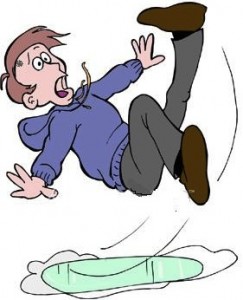What happens if you simply run from the cops
/ A recent Ohio Court of Appeals opinion, an Ohio Court held that the police are not allowed to search a person they are issuing a j-walking ticket to, and they cannot thereafter chase down and search that person when that person walks away rather than be searched. In State v. Baber, the Court addressed a situation where a Cleveland Heights police officer saw the defendant walking down the road at 1:30am and walking in a portion of the road where is was essentially illegal. Rather than just writing the defendant a ticket, the police officer demanded that the defendant place his hands on the police cruiser so the officer could search the defendant. The defendant refused and walked (and then ran) away from the police officer. The officer gave chase, and when he caught the defendant a gun was discovered on the defendant.
The Court said the request to search the defendant was illegal. Nothing in the street encounter gave the police officer "reasonable suspicion" to believe that the defendant was armed or had contraband. The Court held that there was no "reasonable, articulable suspicion that criminal activity may be afoot." The Court also held: "the authority to stop an individual does not necessarily equate to authority to search the individual and place him or her in the back seat of the cruiser."
A recent Ohio Court of Appeals opinion, an Ohio Court held that the police are not allowed to search a person they are issuing a j-walking ticket to, and they cannot thereafter chase down and search that person when that person walks away rather than be searched. In State v. Baber, the Court addressed a situation where a Cleveland Heights police officer saw the defendant walking down the road at 1:30am and walking in a portion of the road where is was essentially illegal. Rather than just writing the defendant a ticket, the police officer demanded that the defendant place his hands on the police cruiser so the officer could search the defendant. The defendant refused and walked (and then ran) away from the police officer. The officer gave chase, and when he caught the defendant a gun was discovered on the defendant.
The Court said the request to search the defendant was illegal. Nothing in the street encounter gave the police officer "reasonable suspicion" to believe that the defendant was armed or had contraband. The Court held that there was no "reasonable, articulable suspicion that criminal activity may be afoot." The Court also held: "the authority to stop an individual does not necessarily equate to authority to search the individual and place him or her in the back seat of the cruiser."
These street encounters happen all of the time - especially after midnight. There have been many court opinions issued involving street encounter circumstances like this. These court opinions are very fact sensitive, and not all court of appeals agree with each other on just exactly how the law works here. We find ourselves facing these issues for a number of our clients all of the time. We expect to see more.


 We often get calls from folks who fell while walking on someone's property - and they often assume that the property owner is liable to them for the injuries they suffered from that fall. However, when applying Ohio law to the facts of many of these cases, the property owner has no liability. Under Ohio law, in order for a property owner to have any liability to someone who is injured on that property, the injured party must prove EITHER: (1) the owner of the property knew of the dangerous condition before the injury, and that owner failed to remedy, or improperly remedied, that dangerous condition, or (2) the property owner actually "created" the dangerous condition. Further, there is a good body of law that states that naturally accumulating ice or snow does not require the owner of the property to clear that accumulation - and if you slip and fall on that naturally accumulation snow and ice, the property owner has no liability to you. Further still, if you trip and fall on a sidewalk where the "crack" is 4 inches or less, then the property owner has no liability to you.
Nevertheless, many times the property owner does, for the reasons stated above, have liability to a person injured on that property. We have successfully obtained reasonable compensation for people in those situations, so feel free to contact us to see if you have a valid claim.
We often get calls from folks who fell while walking on someone's property - and they often assume that the property owner is liable to them for the injuries they suffered from that fall. However, when applying Ohio law to the facts of many of these cases, the property owner has no liability. Under Ohio law, in order for a property owner to have any liability to someone who is injured on that property, the injured party must prove EITHER: (1) the owner of the property knew of the dangerous condition before the injury, and that owner failed to remedy, or improperly remedied, that dangerous condition, or (2) the property owner actually "created" the dangerous condition. Further, there is a good body of law that states that naturally accumulating ice or snow does not require the owner of the property to clear that accumulation - and if you slip and fall on that naturally accumulation snow and ice, the property owner has no liability to you. Further still, if you trip and fall on a sidewalk where the "crack" is 4 inches or less, then the property owner has no liability to you.
Nevertheless, many times the property owner does, for the reasons stated above, have liability to a person injured on that property. We have successfully obtained reasonable compensation for people in those situations, so feel free to contact us to see if you have a valid claim.
